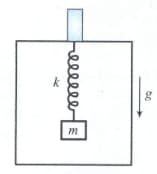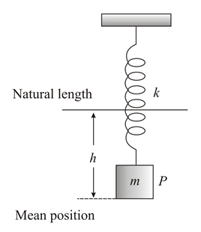B M Sharma Solutions for Chapter: Linear and Angular Simple Harmonic Motion, Exercise 2: CONCEPT APPLICATION EXERCISE
B M Sharma Physics Solutions for Exercise - B M Sharma Solutions for Chapter: Linear and Angular Simple Harmonic Motion, Exercise 2: CONCEPT APPLICATION EXERCISE
Attempt the free practice questions on Chapter 5: Linear and Angular Simple Harmonic Motion, Exercise 2: CONCEPT APPLICATION EXERCISE with hints and solutions to strengthen your understanding. PHYSICS FOR JOINT ENTRANCE EXAMINATION WAVES AND THERMODYNAMICS solutions are prepared by Experienced Embibe Experts.
Questions from B M Sharma Solutions for Chapter: Linear and Angular Simple Harmonic Motion, Exercise 2: CONCEPT APPLICATION EXERCISE with Hints & Solutions
A block of mass is suspended from the ceiling of a stationary elevator through a spring of spring constant ; it is in equilibrium. Suddenly, the cable breaks and the elevator starts falling freely. Show that the block now executes a simple harmonic motion of amplitude in the elevator.

A ball of mass is connected to two rubber bands of length , each under tension as shown in the figure. The ball is displaced by a small distance perpendicular to the length of the rubber bands. Assuming the tension does not change, show that
(a) the restoring force is and
(b) the system exhibits simple harmonic motion with an angular frequency .

A mass attached to a spring oscillates with a period of . If the mass is increased by , the period increases by , find the initial mass assuming that Hooke's law is obeyed.
A spring of spring constant has a block of mass hanging at its one end and from the other end the spring is attached to a ceiling of an elevator. The elevator rises upwards with an acceleration of . When acceleration is suddenly ceased, then what should be the angular frequency and elongation during the time when the elevator is accelerating?
Two blocks lie on each other and are connected to a spring as shown in the figure. What should be the mass of block placed on block of mass so that the system is period is . Assuming no slipping, what should be the minimum value of coefficient of static friction , for which block will not slip relative to block , if block is displaced from equilibrium position and released?
(Given: and )

A body is in SHM with period when oscillated from a freely suspended spring. If this spring is cut in two parts of length ratio and again oscillated from the two parts separately, then the periods are and . Find .
In the figure shown, the block of mass collides with the identical block and after collision they stick together. Calculate the amplitude of resultant vibration.

Figure shows a spring block system hanging in equilibrium. If a velocity is imparted to the block in downward direction, find the amplitude of SHM of the block and the time after which it will reach a point at half of the amplitude of block.

